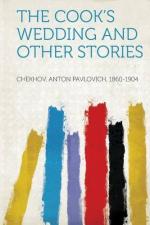“Well, you . . . er . . . show me . . .” Matvey mutters, blinking mildly.
“Show you. . . . It’s always me: me to show you, and me to do it. They have no sense of their own! Mark it out with the compasses, that’s what’s wanted! You can’t break the ice without marking it out. Mark it! Take the compass.”
Matvey takes the compasses from Seryozhka’s hands, and, shuffling heavily on the same spot and jerking with his elbows in all directions, he begins awkwardly trying to describe a circle on the ice. Seryozhka screws up his eyes contemptuously and obviously enjoys his awkwardness and incompetence.
“Eh-eh-eh!” he mutters angrily. “Even that you can’t do! The fact is you are a stupid peasant, a wooden-head! You ought to be grazing geese and not making a Jordan! Give the compasses here! Give them here, I say!”
Seryozhka snatches the compasses out of the hands of the perspiring Matvey, and in an instant, jauntily twirling round on one heel, he describes a circle on the ice. The outline of the new Jordan is ready now, all that is left to do is to break the ice. . .
But before proceeding to the work Seryozhka spends a long time in airs and graces, whims and reproaches. . .
“I am not obliged to work for you! You are employed in the church, you do it!”
He obviously enjoys the peculiar position in which he has been placed by the fate that has bestowed on him the rare talent of surprising the whole parish once a year by his art. Poor mild Matvey has to listen to many venomous and contemptuous words from him. Seryozhka sets to work with vexation, with anger. He is lazy. He has hardly described the circle when he is already itching to go up to the village to drink tea, lounge about, and babble. . .
“I’ll be back directly,” he says, lighting his cigarette, “and meanwhile you had better bring something to sit on and sweep up, instead of standing there counting the crows.”
Matvey is left alone. The air is grey and harsh but still. The white church peeps out genially from behind the huts scattered on the river bank. Jackdaws are incessantly circling round its golden crosses. On one side of the village where the river bank breaks off and is steep a hobbled horse is standing at the very edge, motionless as a stone, probably asleep or deep in thought.
Matvey, too, stands motionless as a statue, waiting patiently. The dreamily brooding look of the river, the circling of the jackdaws, and the sight of the horse make him drowsy. One hour passes, a second, and still Seryozhka does not come. The river has long been swept and a box brought to sit on, but the drunken fellow does not appear. Matvey waits and merely yawns. The feeling of boredom is one of which he knows nothing. If he were told to stand on the river for a day, a month, or a year he would stand there.
At last Seryozhka comes into sight from behind the huts. He walks with a lurching gait, scarcely moving. He is too lazy to go the long way round, and he comes not by the road, but prefers a short cut in a straight line down the bank, and sticks in the snow, hangs on to the bushes, slides on his back as he comes—and all this slowly, with pauses.




